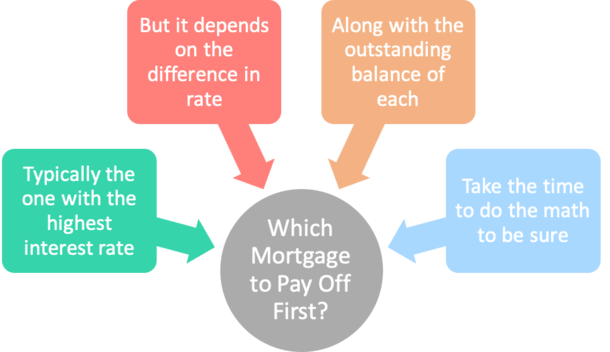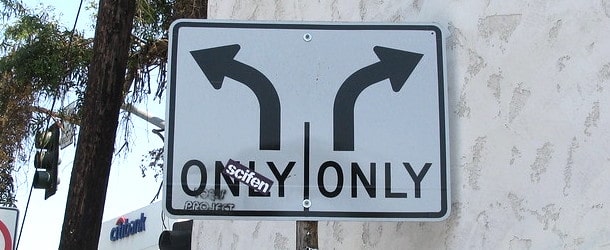Mortgage Q&A : “Which mortgage should I pay off first?”
Today we’re going to talk about strategy if you hold multiple mortgages and want to reduce your total interest expense by paying one off ahead of schedule.
It’s not uncommon to have multiple mortgages, such as a first and second mortgage tied to the same property.
Or perhaps a couple mortgages on separate properties, such as one on a primary home and another on a second home (or investment property).
Before we dig into the details, paying down the loan with the higher interest rate is generally advised.
Generally Best to Pay Off Highest Interest Rate First

- Like any other loan or credit card you have it’s typically beneficial to pay off the one with the highest interest rate first
- This usually means a second mortgage (as they often feature very high mortgage rates)
- Or a mortgage tied to a second home or investment property (they also carry higher rates)
- But you should do the math with an early payoff calculator to be sure of your decision
Let’s consider an example. If you’ve got a first mortgage with an interest rate of 6%, and a second mortgage set at 12%, it’d probably be in your best interest to knock out that second mortgage sooner rather than later.
That means making extra mortgage payments on the second mortgage if you’ve got the money handy (assuming you actually wish to pay down your mortgage ahead of time).
These days you have to question whether borrowers actually want to pay off their mortgages early, as many are locked in at record low rates that are quite favorable to hold onto.
Let’s look at an example to illustrate the possible savings:
1st mortgage: $200,000 loan amount, 30-year fixed @4%
2nd mortgage: $50,000 loan amount, 30-year fixed @8%
Extra payment: $100 per month
Let’s assume you’ve got a first mortgage with an interest rate of 4%, and a second loan set at a rate of 8%.
If you were to pay an additional $100 a month on your first mortgage, you’d save $26,855.30 in mortgage interest over the full duration of the loan, and shave 4 years and 11 months off the loan term.
Conversely, if you decided to pay an extra $100 a month on the second mortgage, you’d save $44,134.28 in interest and shave more than 14 years off the term.
So clearly the move here would to be pay off that second mortgage first, seeing that it has a mortgage interest rate double that of the first mortgage.
What About Mortgages with Different Loan Amounts?
- It may appear that you can save money by paying off a high-balance, lower-rate mortgage
- Assuming the interest rate isn’t much lower than that of the smaller mortgage
- Since larger loan amounts accrue much more interest each month
- But you have to factor in the different payoff periods and apply the funds accordingly
Here’s an example where it appears that paying off a lower-rate mortgage first makes sense:
1st mortgage: $300,000 loan amount, 30-year fixed @4.5%
2nd mortgage: $50,000 loan amount, 30-year fixed @6%
Extra payment: $100 per month
Imagine the loan amount is increased to $300,000 on the first mortgage, the interest rate raised slightly, and lowered to 6% on the second.
It would appear to be in your best interest (no pun intended) to make the extra $100 payment on the larger first mortgage, even though the interest rate is lower than that of the second.
You would save $34,087 in interest over the life of the loan, and shave about three and a half years off your loan.
Conversely, if you chose to make the extra $100 payment on the second mortgage each month, you’d only save $29,226 in interest, though you would shave 13 years and 7 months off the term.
Because the first mortgage is so much larger, a lot more interest accrues, and since the interest rates are fairly similar, the first mortgage winds up being more costly if paid down on schedule.
Be Sure to Consider the Savings From an Early Payoff That Can Be Applied to the Remaining Loan
But it’s not quite that simple. If you applied the extra $100 each month to the second mortgage, it would be paid off in 16 years and five months.
Technically, that means there is now an extra $300 available ($299.78 was the old monthly payment on the second mortgage) to put toward the remaining first mortgage balance.
Remember, the first mortgage would require that extra $100 for about 26 years and five months to realize the full interest savings.
And with the second mortgage payment extinguished about 10 years earlier, it could now be applied to the first mortgage for the remaining loan term.
So you could apply an extra $300 per month to the first mortgage beginning around month 198.
Arguably, you could deploy $400, since you’d have the $300 freed up and the $100 you were previously paying extra.
If you put that $400 extra toward the first mortgage beginning in month 198, you’d save $17,581 in interest.
And the loan would still be paid off roughly three and a half years earlier, just as if you had applied $100 to it instead of the second mortgage.
Collectively, the interest savings would be $46,807, factoring in the $29,226 saved on the second mortgage.
That would be significantly better than the $34,087 in interest saved by simply applying $100 toward the first mortgage from day one.
In summary, put in the time to do the math (using an early payoff calculator) to determine which home loan to pay down first.
Of course, interest rates on second mortgages tend to be a lot higher than first mortgages, so the answer is usually to pay down the second mortgage faster.
Just be sure to pass on the monthly savings to the remaining loan once the other loan is paid off.
[How to pay off the mortgage early.]
Consider All the Details Beyond the Interest Savings
- There are other factors to consider beyond interest rate and loan amount
- Such as if one loan is fixed and another is an ARM (and subject to future rate increases)
- Or if you have other high-interest debt that should be paid off first
- Such as a credit card, student loan, or personal loan
While mathematically speaking it makes sense to pay off the higher-interest rate loan first, there are other considerations.
For example, many second mortgages are adjustable, such as HELOCs, so there’s risk the interest rate could rise over time.
This would give you more incentive to pay it off, to avoid any payment shock or increased interest expense.
Or if you’ve got credit card debt at 29.99% APR, you’ll probably want to pay that off before making extra payments on your mortgage(s), which likely carries a relatively low interest rate.
Some homeowners seem to want to pay down the mortgage as quickly as possible while racking up thousands in finance charges on their credit cards.
This is despite the fact that mortgage interest is tax deductible and credit card interest is not.
Speaking of, you could consider which loans are tax deductible and which are not, and add that to the overall decision as well.
Simply put, it may not always be wise to make larger payments than necessary on your mortgage(s).
Instead, you may want to focus on the loan that carries the higher interest rate and tackle that first.
Read more: Pay off the mortgage or invest?

